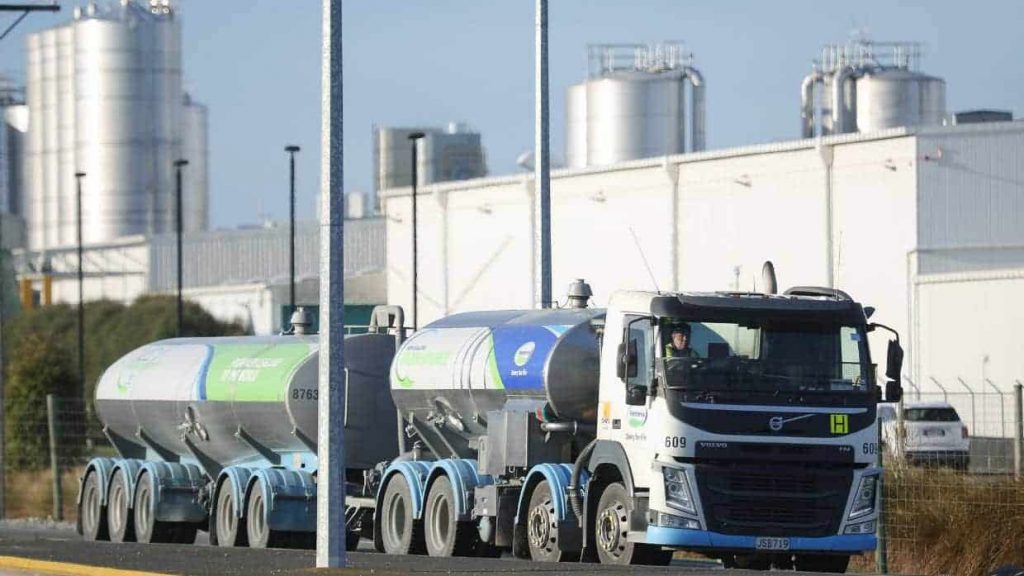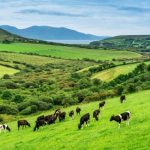
Regional New Zealand is gritting its teeth and getting on with it after news Fonterra and Synlait’s forecast milk price will cut billions of dollars out of the national economy over the next 12 months.
Dairy NZ estimated that taking in wider spending, the loss would be $5 billion. This decline came on top of lower returns for beef and lamb exports on global markets.
On August 4, Fonterra dropped its predicted farm milk gate price to between $6.25 and $7.75 per kilogram of milk solids, with a $7 mid-point, from an earlier forecast of between $7.25 and $8.75. On Friday, Synlait said they were doing the same, in response to an excess of fresh milk on the Chinese market, reduced demand in China and drop in prices.
Federated Farmers dairy industry group chairperson Richard McIntyre, a dairy farmer in Horowhenua near Levin, said many farmers would end below break even in the next 12 months.
“There will be a big hole in cash flows; farmers will cut emergency spending and even essential spending and a lot will depend on what banks are lending and how big an overdraft they can have.

“With a cash flow deficit there will be less spent in towns, in rural supply stores. A pump might have to be fixed, but it won’t be upgraded and will be shelved until next year.”
With government regulations, high inflation, high costs and financial belt tightening McIntyre said it was a tough time.
“On the other side, it’s good that Fonterra gave us the news early. We can cut to fit. There’s nothing worse upgrading things and doing discretionary spending thinking there will be an $8 payout when you find it’s $7.”
Golden Bay dairy farmer and Federated Farmers’ national president Wayne Langford said a survey taken last month of over 1000 dairy, sheep, beef, and arable farmers found confidence had reached historic lows due to the drop in dairy and meat prices, high interest rates, inflation, and regulatory changes. The survey was taken before the predicted drop in dairy payout price and 22% of respondents expected to reduce production in the next 12 months with only 14.5% expecting it to increase.
“This is the second successive farmer confidence survey to set a new record low with a steep decline over the last six months – so we’re sounding the alarm,” Langford said.
Southland

In Southland, the region’s development agency Great South said the direct impact of the dairy forecast price would be a loss of $250m per annum.
The indirect impacts, agriculture services and farm equipment, and the induced impacts, retail sales added a further $115m per annum. The total lost income would approximately $365m over the next 12 months.
The Otago/Southland region had also seen a fall in gross farm revenue of 12.6% due primarily to lower sheep and cattle farm-gate prices. Farm profit was down 42% from last year for beef and lamb farming.
“Agriculture is the biggest contributor to our region’s economy, so there is no doubt the drop in dairy payout and red meat prices will have impact,” Great South chief executive, Chami Abeysinghe said.
“It’s another hit to the sector, which is already facing challenges keeping up with regulatory requirements. Great South is here to support businesses, and we will continue to support the industry as much as we can.”
Canterbury

Canterbury has nearly one million cows in about 1200 herds, and produced 22% of the nation’s total, according to Dairy NZ.
In the entire Canterbury region, the loss to its economy due to the lower dairy payout was expected to be $1 billion.
South Canterbury Chamber of Commerce chief executive Wendy Smith said her district was better placed than others, having a solid diversified economy with an approximate 6.2% of GDP coming from dairy.
“We will undoubtedly see some belt tightening in the business sector but well-run businesses will continue to flourish.”
Manawatu

Amanda Linsley, chief executive of the Manawatū Business Chamber, said dairy, sheep and beef made up around $243m to the regional economy in the year to March 2022, with dairy contributing $142m of that total.
“The industry is also a significant employer. The impact of the drop in Fonterra’s forecast farm gate milk price has not been undertaken at this stage, but there will be a knock-on effect to businesses across the region. When farmers do well, we all do well, the rural/urban connect is strong in our region.
“We hope for a quick recovery from the global economic conditions.”
Taranaki

Taranaki Chamber of Commerce chief executive Arun Chaudhari said the drop in forecast milk payout would probably leave a $1.2 billion hole in the Taranaki economy. Together with higher interest rates and cost of living, the drop in price delivered a “double whammy”.
“Some farmers who took out loans in the last few years will be struggling to pay them back.
“The banks will need to be a bit more accommodating and there could be farms going out of business.”
Taranaki was also coping with the oil and gas ban, he said.
“That has driven away a lot of investors and forced capital to go overseas. Experienced engineers have moved to Australia and Europe.
“It’s not all doom and gloom. We’ve been here before. We’ll get through it, although some will struggle.”

McIntyre said farmers had to remember things were cyclical, and they had just come off a couple of good years. DairyNZ has reported dairy farmers’ total debt this year was $36.3b, down from $41.7b five years ago.
“We went through something similar in 2014/15. The key thing is to remember farming as a business is a three to five year game; and it all averages out over the five years.”
McIntyre’s advice to rural support businesses was to “hang in there.”
“We want to support them, but we will just have to go through the difficulties together. The general feeling is that this is a short-term issue.”
On Friday, Fonterra said it expected full-year earnings to be at the top end of the forecast range of 65 cents to 80c a share and reported strong earnings through the 2023 financial year off the back of favourable ingredient margins.





















